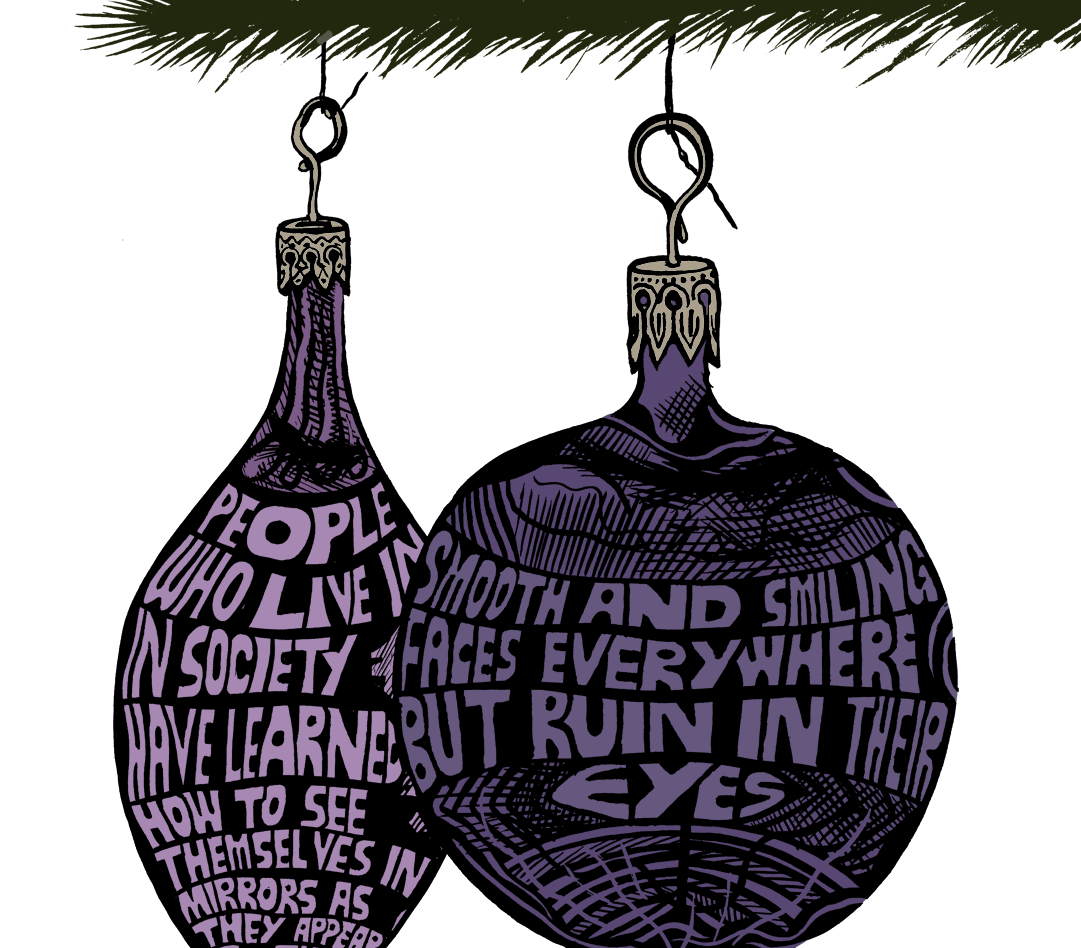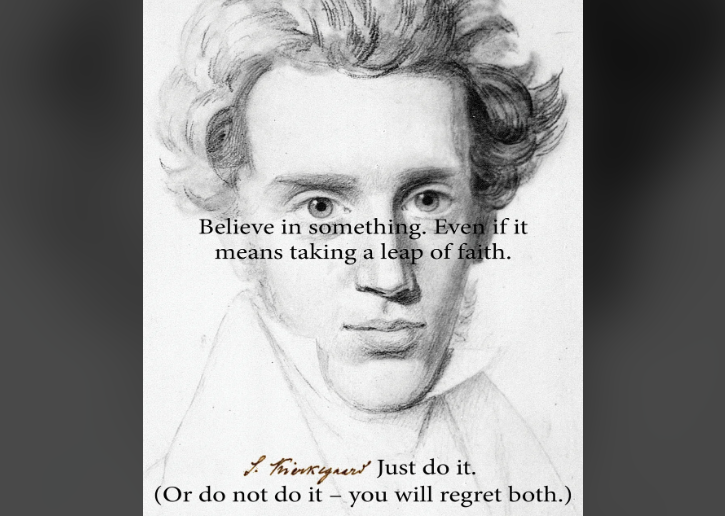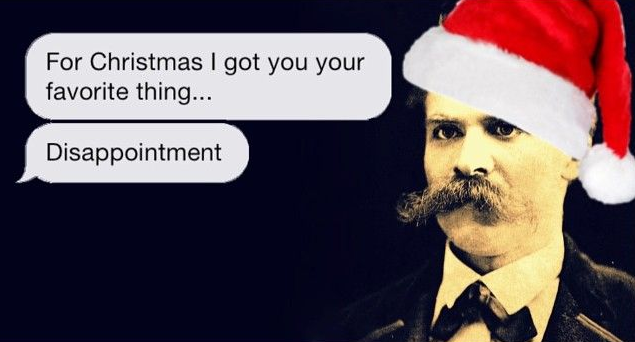By Penny Theodorakopoulou,
Celebrated all throughout the world, Christmas frequently evokes sentiments of coziness, happiness, and togetherness. However, it can also be a period of existential reflection for many. For me, what does Christmas mean? Why do we continue to observe these customs year after year? Existentialism provides a lens through which to examine these issues and discover personal significance in the season for people who feel alienated or disenchanted with the holiday.
The existentialist lens
Supporters of the 19th and 20th century philosophical movement, known as “existentialism”, include Søren Kierkegaard, Friedrich Nietzsche, Jean-Paul Sartre, and Simone de Beauvoir. Existentialism’s key tenets include personal autonomy, decision-making, and the pursuit of meaning in an apparently meaningless universe. This profoundly humanistic worldview emphasizes individual accountability and the production of meaning in a world devoid of it. Sartre is credited as saying, “Man is condemned to be free; because once thrown into the world, he is responsible for everything he does”. Especially during the holidays, when customs and expectations from society may conflict with individual beliefs and experiences, this freedom can feel both freeing and burdensome.

Confronting the absurdity of Christmas
The existentialist, Albert Camus, who is frequently linked to the idea of the absurd, defined the absurd as the conflict between the universe’s apathy and our need for purpose. For people who don’t feel connected to the spirit of the season, the elaboration of Christmas customs, such as singing songs, exchanging gifts, and decorating trees, may appear ridiculous. Why do we devote so much of our time and energy to these pursuits?
In The Myth of Sisyphus, Camus counsels accepting the ridiculous and finding purpose in spite of it rather than giving up. “The struggle itself […] is enough to fill a man’s heart,” he stated. By applying this to Christmas, we might see it as a chance to reaffirm our particular beliefs and reinterpret customs in ways that speak to us. For instance, even if a tree’s original religious meaning does not resonate, decorating it could represent the tenacity of life amid the coldest winter days.

Creating authentic traditions
Authenticity, a notion supported by Heidegger and Sartre, is highly valued in existentialism. Acting in line with one’s actual self, rather than giving in to peer pressure or cultural expectations, is what it means to live genuinely.
Christmas frequently comes with social expectations, such as lavishing on presents, preparing the ideal meal, or portraying a picture of happy family life. These demands may seem inauthentic and oppressive. Sartre cautioned against acting in “bad faith”, which is the practice of lying to oneself in order to meet the expectations of others. Pretending to enjoy customs you do not find meaningful or repressing your own ideals to keep up appearances are examples of ill faith over the holidays.
To counter this, think about the things that are truly important to you about Christmas. Is it spending time with those you love? The opportunity to think and rejuvenate? The delight of donating? You can organize your festivities around those ideals and eliminate the rest by determining what feels genuine.

Kierkegaard’s Leap of Faith
Søren Kierkegaard provides guidance for anyone who is having trouble understanding the religious significance of Christmas. Kierkegaard, the “father of existentialism”, highlighted the significance of one’s own faith and the “leap” necessary to embrace it. For Kierkegaard, faith was a deeply personal, passionate commitment rather than mindless conformity to dogma.
Kierkegaard’s leap of faith has the power to reframe Christmas as an act of deliberate believing, even for nonreligious people. You can choose to believe in the ideals of love, giving, and hope that Christmas represents, even if you do not believe in the nativity tale. This leap is about accepting meaning that feels authentic to you; it does not require approval from others.

Finding freedom in choice
Existentialists concur that our decisions define who we are. According to Sartre, “existence precedes essence”, which means that our essence is something we construct by the choices we make rather than something that is predetermined at birth.
Therefore, Christmas is not a fixed event. You can reshape and alter it to suit your preferences. You could decide to spend the day hiking outdoors, volunteer at a shelter, or create a new custom that aligns with your values. It is liberating and profoundly existential to have the freedom to choose how you celebrate the holiday.
Embracing connection and solidarity
Leading feminist and existentialist, Simone de Beauvoir, highlighted the significance of relationships in determining our humanity. Beauvoir reminded us that our freedom is entwined with the freedom of others, even though existentialism frequently emphasizes individual freedom.
Fundamentally, Christmas is a time for community. The season encourages us to interact with others, whether through get-togethers with family, charitable deeds, or customs. According to Beauvoir’s perspective, we should approach these exchanges with authenticity, acknowledging the shared humanity and vulnerability they imply.
Existentialism provides comfort to people who experience loneliness or disconnection over the holidays. A simple act of kindness or connection, like calling an old friend or sharing a meal with a complete stranger, can establish our place in the web of human existence, according to Beauvoir’s appeal for solidarity.

Christmas as an act of creation
Nietzsche’s “eternal recurrence” theory pushes us to live as though we would voluntarily live our lives, decisions, and experiences repeatedly. This concept challenges us to design a life that we can firmly believe in.
By applying this to Christmas, we might view the occasion as a creative act. We can make Christmas a holiday we would be happy to remember by intentionally creating traditions, savoring happy moments, and finding beauty in the ordinary. Nietzsche’s exhortation to “say yes to life” inspires us to appreciate the season despite its flaws.

Conclusion: Have a wonderful, personal Christmas
Finding meaning in a way that is consistent with your true nature is the goal of an existential Christmas, not abandoning customs or accepting cynicism. The holiday becomes a platform for individual expression, whether via introspection, connection, or reinvention.
According to Sartre, “Life has no meaning a priori […] it is up to you to give it a meaning, and value is nothing but the meaning that you choose”. Enjoy the flexibility to decide what the season means to you this Christmas. By doing this, you will discover the deep fulfillment of living genuinely as well as the excitement of the holiday.
References
- Have yourselves a Merry Existential Christmas! medium.com. Available here
- Christmas in an Age of Existential Crisis. nationalreview.com. Available here




